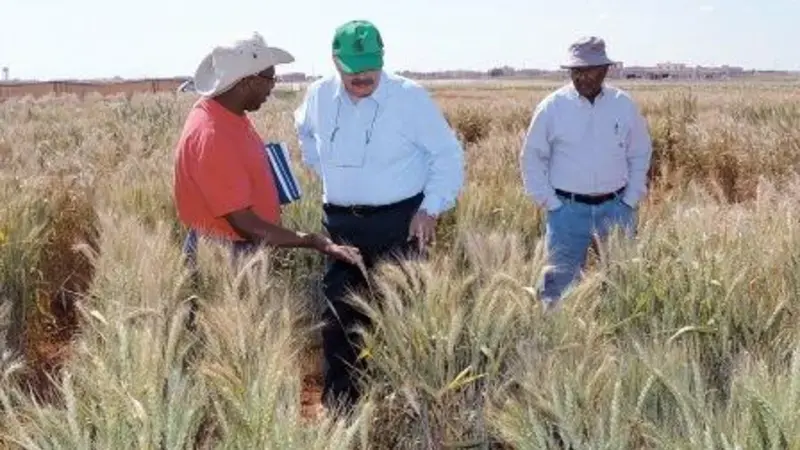A global strategy for ICARDA's wheat program

ICARDA’s wheat program continues to deliver benefits in partner countries and is using the decentralization of the Center’s operations to strengthen collaborations and more effectively target national and regional priorities. This evolution presents a unique opportunity for the program to not only strengthen its ongoing research activities but to develop and grow.
Wheat is a crucial commodity across the world’s dry areas where ICARDA works with national partners to raise productivity and develop new varieties to help farmers mitigate the effects of debilitating diseases, biophysical constraints, and the multiple challenges posed by climate change. These continuing efforts are being pursued at existing and new locations – from Morocco to Sudan, and research sites in Turkey, Iran, and Central Asia.
“Decentralization presents challenges, but it also offers ICARDA an opportunity to strengthen and grow,” said Michael Baum, Director of ICARDA’s Biodiversity and Integrated Gene Management Program. “The Center’s wheat research is no exception – with outputs now targeting a much closer alignment with national and regional priorities. An evolving research infrastructure – strengthened capacity at existing locations and the development of new research platforms – also guarantees that ICARDA’s research continues to help farmers sustain their wheat production against a backdrop of rising temperatures and more intense and variable rainfall.”
This strategic move has relocated facilities and staff to integrated research platforms that address specific priorities and facilitate collaboration and partnerships with national programs, advanced research institutions, and other partners in the development and dissemination of new technologies. The new research agenda will be operated through three major research platforms, each located in a different region but serving dry areas globally:
West Asia: ICARDA has expanded facilities and activities in Lebanon, where a fully-functional wheat breeding station, international nurseries and a seed health laboratory have been established. Breeders are able to take advantage of optimal conditions, producing two crop generations in a single year.
North Africa: Building on an existing relationship with Morocco’s Institute National de la Recherche (INRA), and focused on the intensification and diversification of rainfed cereal-based production systems, ICARDA researchers have established a 100-ha research station where they are testing wheat resistance to heat, drought, and Hessian fly. Scientists also have access to the facilities of a further 6-8 INRA research stations.
Sub-Saharan Africa: Building on a partnership with the International Livestock Research Institute and the Ethiopian Institute for Agricultural Research (EIAR), scientists at the Sub-Saharan platform in Ethiopia are testing wheat varieties for a range of stresses, including stripe rust and stem rust variants such as Ug99.
In addition to these integrated research platforms, decentralization has provided an opportunity to strengthen capacity at existing research sites where wheat research activities are on-going and target specific priorities related to wheat production.
Egypt for High-Input Agriculture Research: Egypt provides a platform with a targeted focus on high-input irrigated agricultural systems. Activities contribute to collaborative research at Sids research station on the management of irrigation systems and irrigated wheat improvement. While geographically located in North Africa, this site represents irrigated agricultural production systems generally, an important element of dryland production systems.
Turkey, Central Asia and Iran for Winter Wheat and Winter Barley Research Location: The extensive high altitude and highland agro-ecologies with severe winters are particularly suitable for breeding winter and facultative wheat which is done as part of the International Winter Wheat Improvement Program (IWWIP) where Turkey, CIMMYT and ICARDA work jointly together. Collaboration also builds on the CGIAR Program for Central Asia and the Caucasus in Tashkent, Uzbekistan. Wheat varieties developed in Ankara, Turkey, are also being tested in Central Asia.
Turkey/ICARDA Cereal Rust Research Center: Located in Izmir and a partnership with the Turkish Ministry of Food, Agriculture, and Livestock, the Center provides countries with scientific expertise and services to identify and track wheat rust diseases: analyzing rust samples; identifying specific rust races and their virulence to specific varieties of wheat; screening of wheat varieties sent by countries, for resistance to different types of rust; and offering advice on wheat varieties that best resist rust diseases in specific agro-climatic conditions.
Sudan Heat Tolerance Research Location: Building on on-going collaborations with the Agricultural Research Corporation (ARC), this location in Wad Medani, in the Sudan, offers high temperatures and short seasons for breeding heat tolerant early-season wheat varieties, which are distributed to countries across the dry areas. Recently, high-yielding, heat-tolerant wheat varieties were distributed to northern Nigeria where they are now generating 5-6 t/ha, convincing Nigerian policymakers that a viable solution to their country’s growing dependence on wheat imports is domestic production – a policy shift that will protect Nigerians from the vagaries of global commodity markets and strengthen national food security.
